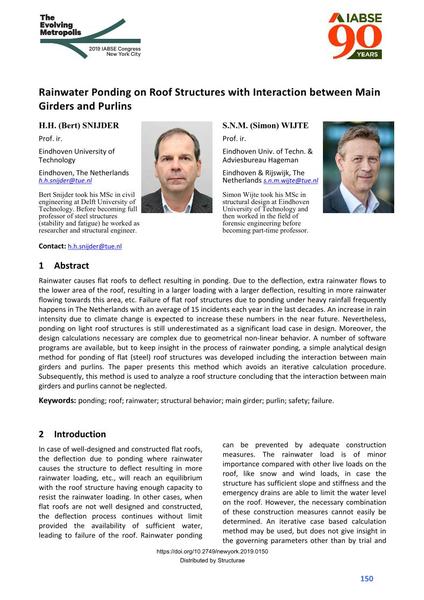Rainwater Ponding on Roof Structures with Interaction between Main Girders and Purlins

|
|
|||||||||||
Bibliografische Angaben
| Autor(en): |
H. H. (Bert) Snijder
(Eindhoven University of Technology)
S. N. M. (Simon) Wijte (Eindhoven University of Technology; Adviesbureau Hageman) |
||||
|---|---|---|---|---|---|
| Medium: | Tagungsbeitrag | ||||
| Sprache(n): | Englisch | ||||
| Tagung: | IABSE Congress: The Evolving Metropolis, New York, NY, USA, 4-6 September 2019 | ||||
| Veröffentlicht in: | The Evolving Metropolis | ||||
|
|||||
| Seite(n): | 150-157 | ||||
| Anzahl der Seiten (im PDF): | 8 | ||||
| DOI: | 10.2749/newyork.2019.0150 | ||||
| Abstrakt: |
Rainwater causes flat roofs to deflect resulting in ponding. Due to the deflection, extra rainwater flows to the lower area of the roof, resulting in a larger loading with a larger deflection, resulting in more rainwater flowing towards this area, etc. Failure of flat roof structures due to ponding under heavy rainfall frequently happens in The Netherlands with an average of 15 incidents each year in the last decades. An increase in rain intensity due to climate change is expected to increase these numbers in the near future. Nevertheless, ponding on light roof structures is still underestimated as a significant load case in design. Moreover, the design calculations necessary are complex due to geometrical non-linear behavior. A number of software programs are available, but to keep insight in the process of rainwater ponding, a simple analytical design method for ponding of flat (steel) roof structures was developed including the interaction between main girders and purlins. The paper presents this method which avoids an iterative calculation procedure. Subsequently, this method is used to analyze a roof structure concluding that the interaction between main girders and purlins cannot be neglected. |
||||
| Stichwörter: |
Versagen Dach Tragverhalten Sicherheit Pfette Hauptträger Wasseransammlung
|
||||
